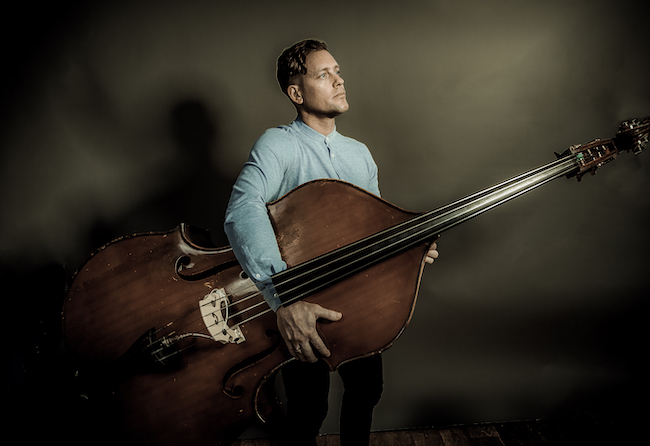Jan 13, 2026 2:09 PM
More Trump-Kennedy Center Cancellations
The fallout from the renaming of the John F. Kennedy Center for the Performing Arts to include President Donald…

Bassist Michael Janisch helms Whirlwind Records and is set to release his latest leader date, Worlds Collide.
(Photo: Carl Hyde)First and foremost, Michael Janisch is a bassist. He’s about to drop his third solo album after having worked as a sideperson with dozens of A-list jazz players and toured relentlessly with innumerable bands. So, yes, a bassist first.
But in 2010, Janisch started a label, Whirlwind Recordings, as a means of getting his own music out there. The imprint thrived, and during the past 10 years it’s continued to rise in stature in the indie-jazz world, shifting as needed to embrace innovation in the music business. This is Janisch’s doing. Besides his talents as a performing artist, his entrepreneurial skills as a record producer are undeniable.
The backstory for Janisch’s new album, Worlds Collide, demonstrates as much. To start, after touring for almost three years following his 2015 release, Paradigm Shift, the bassist decided to make a switch in his usual personnel. “I had done a lot collaborative projects in the U.K. and wanted to play with an all-American band,” the Wisconsin-born Janisch recalled during a phone call from London, his home for the past 14 years. “I don’t know if I was feeling homesick or what.”
After that decision, the album happened quickly. He wrote the music a month before the session, flew the band to London and recorded at the historic Abbey Road Studios only four days after the group’s first rehearsal. Next, the band went on tour, debuting Janisch’s new music at both the London Jazz Festival and the Hull Jazz Festival, both in the U.K., while the French channel Mezzo TV taped one of the ensemble’s live performances for a globally syndicated broadcast. No pressure.
The tunes on Worlds Collide are not easy, either. For instance, the track “Another London” nods to the Afrobeat sound of Nigerian composer Fela Kuti with ringing vertical horn parts synced over an oddly metered, funkish drum feel. An electronic riff cycles throughout until an insistent bop saxophone solo reclaims jazz as the tune’s fundamental context.
“A big movement in London now is post-acid jazz, very influenced by Afro-pop, so that’s got into my blood a bit,” Janisch said, in discussing the tune. “The music sounds electronic in the compositional elements, but you play it on acoustic instruments.”
On the flip side of the “Another London” lies “Frocklebot,” a contemporary jazz composition heavily weighted toward free horn solos; this track is more viscerally American in its feel than some others on the record. “‘Frocklebot’ is quite out and has an Ornette Coleman kind of vibe,” Janisch explained. “I wrote it so that the album would have some more chill parts.”
European trends in electro-acoustic sounds have intrigued Janisch for a while, and he notes the irony of using an all-American band to tap into them. “This album is a real mix of influences, which is why it’s called Worlds Collide,” he said.
Even so, when it comes to business he draws clear boundaries; Janisch doesn’t broach label concerns when he’s working as a sideman. So, the bassist and critically lauded saxophonist Seamus Blake—longtime sideplayers together on others’ projects—both were pleased when Blake’s new management serendipitously chose Whirlwind for his 2019 Guardians Of The Heart Machine.
“[Whirlwind] seemed the best in terms of momentum and publicity ... and I think that Michael did a great job [with the release],” Blake asserted. “Whereas a lot of people are giving up hope on the record industry, Michael seems to find a way to keep a viable business model happening. That’s rare nowadays.”
Signed artists like Blake stand to benefit from Janisch’s current plans for the label: As its 10-year anniversary approaches, Janisch expects collaborations with arts councils, outreach into new territories and residencies for its musicians. Janisch has plans, too, for his own music—to double down and release more of it. “I used to play bass for eight hours a day. It made me happy, and I want to get back to that,” he said. As always, a bassist first. DB

Belá Fleck during an interview with Fredrika Whitfield on CNN.
Jan 13, 2026 2:09 PM
The fallout from the renaming of the John F. Kennedy Center for the Performing Arts to include President Donald…

Peplowski first came to prominence in legacy swing bands, including the final iteration of the Benny Goodman Orchestra, before beginning a solo career in the late 1980s.
Feb 3, 2026 12:10 AM
Ken Peplowski, a clarinetist and tenor saxophonist who straddled the worlds of traditional and modern jazz, died Feb. 2…

The success of Oregon’s first album, 1971’s Music Of Another Present Era, allowed Towner to establish a solo career.
Jan 19, 2026 5:02 PM
Ralph Towner, a guitarist and composer who blended multiple genres, including jazz — and throughout them all remained…

Rico’s Anti-Microbial Instrument Swab
Jan 19, 2026 2:48 PM
With this year’s NAMM Show right around the corner, we can look forward to plenty of new and innovative instruments…

Richie Beirach was particularly renowned for his approach to chromatic harmony, which he used to improvise reharmonizations of originals and standards.
Jan 27, 2026 11:19 AM
Richie Beirach, a pianist and composer who channeled a knowledge of modern classical music into his jazz practice,…